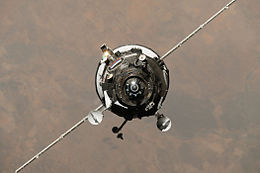Progress M-06M

Progress M-06M approaches the space station on 4 July 2010
|
|
| Mission type | ISS resupply |
|---|---|
| Operator | Roskosmos |
| COSPAR ID | 2010-033A |
| Spacecraft properties | |
| Spacecraft type | Progress-M 11F615A60 |
| Manufacturer | RKK Energia |
| Start of mission | |
| Launch date | 30 June 2010, 15:35 UTC |
| Rocket | Soyuz-U |
| Launch site | Baikonur Site 1/5 |
| End of mission | |
| Disposal | Deorbited |
| Decay date | 6 September 2010 |
| Orbital parameters | |
| Reference system | Geocentric |
| Regime | Low Earth |
| Inclination | 51.6 degrees |
| Docking with ISS | |
| Docking port | Zvezda |
| Docking date | 4 July 2010, 16:17 UTC |
| Undocking date | 31 August 2010, 11:25 UTC |
Progress M-06M, identified by NASA as Progress 38P, is a Russian Progress spacecraft which was launched in June 2010 to resupply the International Space Station. It was the 38th Progress to dock with the space station and the third of year 2010.
The Soyuz-U rocket used to launch the Progress M-06M spacecraft was delivered to the Baikonur Cosmodrome in early March 2010. The rocket was manufactured by TsSKB-Progress at Samara.
The Progress was launched successfully on 30 June 2010 at 15:35 UTC. The cargo ship was loaded with 870 kilograms (1,920 lb) of propellant, 50 kilograms (110 lb) of oxygen and air, 100 kilograms (220 lb) of water and 1,210 kilograms (2,670 lb) of equipment, spare parts and experiment hardware.
The spacecraft reached a preliminary orbit of 193 by 241 kilometres (120 by 150 mi). A series of precise engine firings over two days guided the craft towards a docking with the International Space Station's aft Zvezda port originally scheduled for 2 July.
While approaching the ISS on 2 July 2010, the spacecraft aborted the docking procedure after a critical communications error. The spacecraft bypassed the station at a safe distance. According to the official statement of the Moscow mission control, the approach to the ISS went normally until the distance of around 2 kilometres (1.2 mi) when the ship's KURS automated rendezvous system issued a command prohibiting further "dynamic operations". The telemetry between the spacecraft and the ISS was lost about 25 minutes before planned docking. According to NASA, the most likely cause of the aborted docking was traced to the activation of the TORU "Klest" TV transmitter, which created interference with TORU manual rendezvous system, causing a loss of the TORU command link between spacecraft and the ISS that triggered the abort of the Progress docking. The Russian flight control team later confirmed that the KURS system operated normally during the aborted docking attempt and did not fail, as was initially believed.
A RSC Energia accident commission completed an investigation into the docking failure and concluded that a "dynamical mode abort" command in the spacecraft's backup manual approach control loop had caused the anomaly. The command was generated because of interference in the TORU metric wave signal link and pressed button “Operation” on the TORU panel in the space station's Zvezda module.
...
Wikipedia
